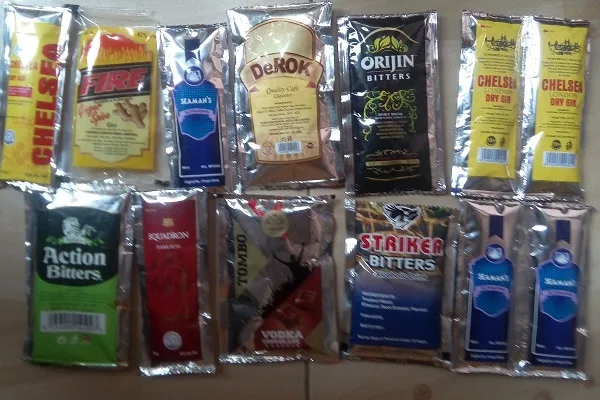The National Agency for Food and Drug Administration and Control (NAFDAC) has officially prohibited the production and sale of alcoholic beverages in sachets less than 200ml.
The ban, which took effect on February 1, 2024, comes after a five-year transition period initiated in 2018, and its enforcement marks a significant step toward safeguarding the well-being of Nigerian children.
Addressing the media in Abuja on Monday, February 5, Prof Mojisola Adeyeye, the director-general of NAFDAC, clarified that the ban wasn’t abrupt. Instead, it resulted from a phased approach recommended by a high-powered committee involving the Federal Ministry of Health, NAFDAC, the Federal Competition and Consumer Protection Commission (FCCPC), and industry representatives like the Association of Food, Beverages and Tobacco Employers (AFBTE) and the Distillers and Blenders Association of Nigeria (DIBAN).
The phased approach initially aimed at reducing production by 50% by 2020 and ultimately implementing an outright ban on January 31, 2024. To reinforce the decision, NAFDAC didn’t renew licenses beyond January 2024 for manufacturers of these products.
Prof Adeyeye emphasized that the ban on alcoholic sachets was driven by the need to protect underage children from the negative effects of these pocket-sized, affordable drinks. She stated that children easily fall prey to these packages, leading to potential consequences in the future.
“The people who are mostly at risk of the negative effect of consumption of the banned pack sizes of alcoholic beverages are the under-aged and commercial vehicle drivers and riders,” Adeyeye noted.
Citing the World Health Organization’s findings, she pointed out that children who consume alcohol are more likely to engage in risky behavior, suffer health problems, and face educational challenges. Moreover, harmful alcohol consumption is linked to various health conditions, including infectious and non-communicable diseases.
While enforcing the ban, NAFDAC discovered that some manufacturers continued production despite the ban, accumulating significant stocks of both finished products and packaging materials. Adeyeye expressed serious concern about this violation of Nigerian laws and warned of potential legal consequences.
Despite potential pushback, Adeyeye affirmed the commitment of NAFDAC to implementing strict regulations aimed at protecting Nigerians, particularly vulnerable youth, from the hazards of irresponsible alcohol consumption. She urged all holders of banned alcoholic products and packaging materials to report to NAFDAC promptly to hand over these items for destruction, emphasizing the agency’s unwavering commitment to public health.










Join our Channel...